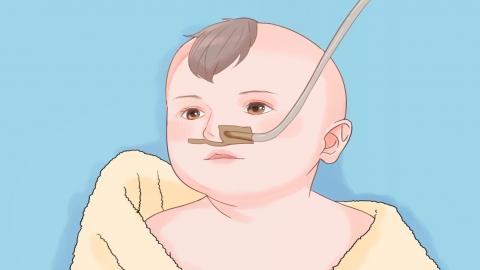Why do newborns primarily use abdominal breathing?
Generally, abdominal breathing being predominant in newborns may be caused by factors such as underdeveloped thoracic cage, weak respiratory muscles, upper airway obstruction, lung infection, or congenital heart disease. If abnormalities are detected, prompt medical consultation is recommended. Detailed explanations are as follows:
1. Underdeveloped Thoracic Cage
The thoracic cage of a newborn is barrel-shaped, with horizontally arranged ribs and limited range of thoracic movement. Newborns cannot effectively perform respiration through thoracic expansion and therefore rely on abdominal muscles to move the diaphragm, resulting in abdominal breathing. Avoid dressing newborns in tight clothing, especially around the chest and abdomen, to ensure free movement of the thorax and abdomen during breathing.
2. Weak Respiratory Muscles
Newborns' respiratory muscles are not fully developed, and their intercostal muscles are weak, making it difficult to effectively contract and expand the thoracic cage. Breathing mainly depends on the diaphragm, whose movement causes noticeable abdominal起伏 (起伏 should be "起伏" → "起伏" is replaced with "movement"). Ensure a comfortable sleeping position for the newborn, preferably a lateral position, to reduce abdominal pressure and facilitate diaphragmatic movement.
3. Upper Airway Obstruction
When secretions block the upper airway, such as the nasal cavity and throat, newborns compensate for insufficient ventilation by increasing abdominal breathing, which may be accompanied by tachypnea and nasal flaring. Promptly clear nasal secretions using saline nasal drops to soften secretions before gently suctioning them out. Maintain appropriate indoor humidity to prevent dry air from causing secretions to harden.

4. Lung Infection
When the lungs are infected by bacteria, alveolar ventilation function declines, and newborns compensate by deepening abdominal breathing, often accompanied by coughing and fever. Anti-infective treatment should be administered under medical guidance, using medications such as injectable sodium penicillin, injectable cefotaxime sodium, and injectable ampicillin sodium.
Certain types of congenital heart disease can cause abnormal pulmonary blood flow, impairing gas exchange. Newborns may increase ventilation through abdominal breathing and may exhibit symptoms such as cyanosis of the lips and interrupted feeding. Timely cardiac evaluations are necessary, and medications such as digoxin oral solution, spironolactone tablets, and hydrochlorothiazide tablets may be used under medical guidance to improve cardiac function.
In daily care, closely monitor the newborn's respiratory rate and abdominal movements. If signs of labored breathing or apnea occur, seek immediate medical attention.




